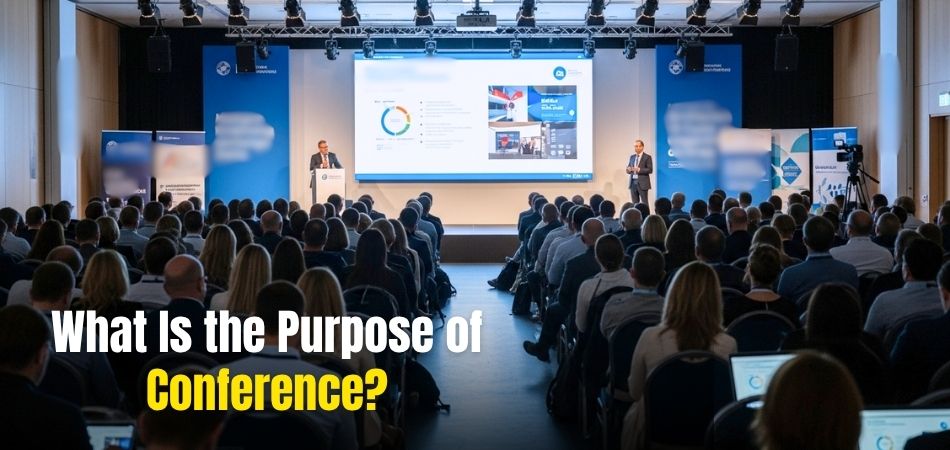These days, everyone seems to be talking about learning, sharing, and meeting new people. Many events bring people together, but conferences stand out for their special purpose. Whether it’s for work, study, or just to learn, one question often comes to mind: What is the purpose of a conference?
The purpose of a conference is to share knowledge, build connections, and promote learning. Conferences help people exchange ideas, present research, and stay updated in their field. They also inspire new goals, encourage teamwork, and create future opportunities through direct interaction with experts and peers.
Do you want to understand more about how conferences help people learn and grow? Then keep reading because this article will explain everything you need to know about the true purpose and importance of conferences in simple and understandable terms.
What Is the Purpose of a Conference?
Conferences are special events where people come together to share knowledge. They give a space to learn new things, connect with others, and grow in different ways. These gatherings help people exchange ideas, solve problems, and gain useful insights. Let’s look at the main purposes of a conference in detail below.

Learn From Experts
Conferences allow people to learn directly from skilled professionals. Speakers share facts, updates, and real examples from their work. Listening to them helps attendees understand topics better and learn new methods. It is a good way to grow knowledge in a short time while hearing from the best.
Share New Ideas
A conference is not just for listening; it is also for sharing. People can present their thoughts, research, or projects. When many people share different ideas, it creates new ways of thinking. This sharing helps everyone find better solutions to common problems.
Build Connections
One of the main reasons people attend conferences is to meet others. Attendees talk with professionals, students, and leaders from different places. These talks can lead to friendships, teamwork, or even future jobs. Meeting face-to-face builds stronger relationships than just online chats.
Gain Inspiration
Conferences often fill people with new energy and motivation. Hearing success stories and smart ideas pushes others to do better. When people leave the event, they often feel ready to start new goals. This positive boost is one of the best takeaways from any conference.
Stay Updated
Every field changes with time. Conferences help people stay up-to-date with the latest news, tools, or research. Attendees also get details about upcoming conferences that match their interests. This helps them stay ready for new opportunities and future changes in their area of work.
Share Research Results
Researchers and students often attend conferences to present their studies. This helps others understand their findings and give helpful feedback. When research is shared, it can guide future projects. It also helps the community grow with facts instead of only opinions.
Promote Teamwork
Conferences encourage people to work together. Group discussions and workshops bring new ideas to life. Working with others at these events helps build stronger skills. It also teaches the importance of listening, planning, and teamwork.
Create Future Opportunities
Attending a conference can open many doors. It can lead to job offers, project invites, or speaking chances. When people show interest and knowledge, others notice them. These moments can change careers and help in long-term success.
Spread Knowledge
Conferences help in sharing useful information widely. When people attend and later talk about what they learned, the knowledge spreads. This way, even those who did not attend get to learn something new. It builds a smarter and more informed community.
Who Actually Goes to Conferences?
Many people think conferences are only for business experts or big names. But in truth, people from many different backgrounds attend them. From students to professionals, each person joins for their own reason. Let’s look at who really goes to conferences and why it matters to attend one.
Students
Many students go to conferences to learn outside their classrooms. They listen to experts, ask questions, and see new ideas in action. These events help them explore subjects they care about. Attending also builds confidence and shows them real examples of what they study in books.
Teachers and Educators
Teachers often join conferences to learn better ways to teach. They meet others who share similar goals and exchange classroom tips. By learning from new research and ideas, they improve their teaching style. It helps them bring fresh and useful lessons back to their students.
Professionals
People working in offices, hospitals, or labs also attend conferences. They go to learn about the latest tools, trends, or research in their field. Meeting others with similar jobs helps them grow faster. It also gives them new ideas they can use in their daily work.
Business Owners
Many business owners attend to find partners, clients, or new ideas. They use conferences to show their products and meet investors. It is also a good place to understand market needs and future changes. By joining these events, they often get a chance to grow their company.
Researchers
Researchers join conferences to present their studies and get feedback. They meet other experts who help them improve their work. Sharing their findings also builds their name in the research community. Some also learn about new projects that might suit their next topic.
Organizers and Volunteers
Conferences are not possible without organizers and volunteers. They manage the schedule, guide guests, and make sure things run smoothly. Being part of such events gives them real experience in teamwork and planning. They also prepare lists with names for conference participants to help everything stay organized and easy to manage.
Common Types of Conferences That People May Attend
Conferences come in many types, each with its own purpose and audience. Some focus on learning, while others help people connect or share research. No matter the type, each one offers something useful to the attendees. Let’s explore the common types of conferences that people often attend.
Academic Conferences
These are mostly for teachers, students, and researchers who love to learn. They discuss studies, share research papers, and explore new findings. Attendees get a chance to present their work and gain feedback. Such conferences help spread knowledge and connect people with similar academic interests.
Business Conferences
These events focus on growth, planning, and better work ideas. Business owners, managers, and employees join to learn about new trends. They discuss market changes, product ideas, and ways to improve sales. Many companies use these meetings to build stronger networks and create new business ties.
Technology Conferences
These focus on new inventions, software updates, and digital changes. Experts share the latest tech tools and future plans in their talks. Attendees get to see live demos and learn from skilled professionals. Many people also visit to connect with tech companies and find new job options.
Educational Conferences
Teachers, trainers, and education experts attend these events to learn better teaching methods. They share ideas, classroom tools, and modern learning styles. These conferences aim to improve how education is given and received. Attendees also get to meet others who care deeply about improving education.
Medical Conferences
Doctors, nurses, and healthcare workers join these meetings to share updates. They talk about new treatments, medicines, and patient care ideas. Attending helps them stay current with the latest in the medical world. It also builds teamwork among hospitals and health professionals across different areas.
Industry-Specific Conferences
Many fields, like fashion, travel, or the environment, have their own events. People working in these areas attend to share trends and challenges. Each industry conference helps improve knowledge and connect experts in one place. These meetings also help in planning better products and smarter business ideas.
What Are the Steps People Can Take to Attend a Conference?
Attending a conference is not just about showing up on the day. It takes a bit of planning and some smart steps to make it smooth. Let’s look at what people should do to attend a conference successfully:
Set a Clear Goal
Before doing anything else, decide why you want to attend the conference. You may want to learn something new, meet experts, or present your ideas. When you define goals and objectives for conference participation, it helps you stay focused. It also guides you in picking sessions and planning your time wisely.
Find the Right Conference
The first step after setting your goal is to choose a suitable event. Look for conferences that match your interests or work field. You can find them online or through professional groups. Picking the right one helps you learn more and meet the right people.
Check the Conference Details
After choosing, it is important to read all event details carefully. Check the dates, location, and conference theme before making plans. Some events are in person, while others are online. Knowing all these details early helps you prepare without confusion or last-minute stress.
Register for the Event
Most conferences require registration before attending. Visit the official website and fill out the form correctly. Some may have early-bird discounts, so try to register early. Once registered, save the confirmation email and any ticket or entry code safely.
Plan Your Budget
Before going, make sure to plan your costs. Include travel, food, hotel, and ticket fees in your list. Having a set budget helps you spend wisely during the event. Some companies even support their employees by paying part of the cost.
Apply for a Visa
If the conference is in another country, you may need a visa. Check the visa type that fits your travel purpose. Apply early to avoid delays, as the process can take time. Keep your invitation letter, passport, and all other documents ready for a smooth approval.
Arrange Travel and Stay
If the conference is far, plan your trip in advance. Book your flight or train tickets early for better prices. Also, find a hotel near the venue to save time. Proper planning makes your visit easy and lets you focus on learning and meeting people.
Prepare Your Materials
It helps to carry things like notebooks, pens, and your business cards. If you are a speaker or presenter, prepare slides and notes early. Bring digital copies too, in case you need to share them. Having everything ready helps you stay confident and organized during the event.
Join the Sessions Actively
During the conference, attend as many sessions as possible. Listen carefully, take notes, and ask questions politely. Joining discussions helps you understand topics better. Active participation also leaves a good impression and helps you connect with others easily.
Things to Do After Attending a Conference
Attending a conference is only the start of learning and growth. What you do afterward can make a big difference in what you gain. It is the time to reflect, share, and apply what you learned. Let’s look at the key things to do after attending a conference.
Review Your Notes
After the conference, go through the notes you took during the sessions. Highlight the most useful points or ideas you want to remember. Organize them in a way that makes sense to you. Reviewing soon after helps you keep the information fresh and easier to apply.
Connect With New Contacts
Make sure to stay in touch with people you met at the event. Add them on social media or send a short thank-you message. Keeping those connections alive can help in future projects or jobs. Networking works best when you stay friendly and active after meeting someone.
Share What You Learned
Talking about what you learned helps others as well. You can share your experience with your team, friends, or online groups. It spreads useful knowledge and shows your interest in the topic. Sharing also helps you remember and understand the lessons even better.
Apply New Ideas
Try to use what you learned in your daily work or studies. Even small changes can make a big difference. Applying new methods helps you see real results from the conference. It turns ideas into action and keeps your learning experience alive.
Give Feedback to Organizers
If the event organizers ask for feedback, take a few minutes to respond. Share what you liked and what could be improved. Honest feedback helps make future conferences better for everyone. It also shows that you care and appreciate their hard work.
Follow Up on Promises
If you told someone you would share a file, article, or idea, do it soon. Following up shows that you are reliable and professional. It also helps build stronger relationships with the people you meet. Keeping your word always leaves a good impression.
Plan for the Next Event
Once you have used what you learned, start thinking ahead. Make a list of events or topics you want to explore next. This helps you keep growing and stay active in your field. Planning ahead ensures you never miss another great learning chance.
Frequently Asked Questions
Conferences are full of learning, sharing, and connecting opportunities. But many people still have questions about what makes them so special and helpful. To make it easier, here are some common questions and answers that explain more about the true purpose of a conference.
How Do Conferences Help in Personal Growth?
Conferences help people grow by building confidence and communication skills. Speaking with new people and sharing ideas improves how you express yourself. You also learn to listen better and think differently. These events push you to step out of your comfort zone and learn from others’ experiences.
Why Are Conferences Important for Learning?
Conferences give people a chance to learn from real experts. The lessons you gain come from practical examples, not just books. You hear about new discoveries and updates in your field. This kind of direct learning helps you stay sharp and ready for changes in your career.
How Do Conferences Encourage New Thinking?
Attending conferences helps open your mind to new ideas. Listening to others’ views lets you see problems from different angles. You start thinking creatively and come up with better solutions. This habit of fresh thinking helps you in both work and personal life.
What Makes Conferences Different From Workshops?
Conferences are usually larger events with many speakers and topics. Workshops, on the other hand, are smaller and focus on hands-on learning. Conferences give a broad view of a subject, while workshops help you practice skills. Both are useful but serve different purposes.
How Do Conferences Benefit Communities?
Conferences bring people together to discuss common goals and challenges. The ideas shared often lead to projects that help society. For example, education or health conferences can inspire community programs. They help people work together for the good of everyone.
What Can First-Time Attendees Expect at a Conference?
New attendees can expect to meet friendly people and learn a lot. Most conferences have welcome sessions, group talks, and networking time. It may feel busy at first, but it becomes easier once you join in. The key is to listen, learn, and enjoy the experience.
What Are Poster Presentations at Conferences?
Poster presentations are short displays of research or projects. They allow participants to explain their work using charts and visuals. Visitors can ask questions and give feedback. It’s a simple and creative way to share knowledge and learn from others’ comments.
Conclusion
Conferences bring people together in ways that online meetings never can. They create real moments of learning, sharing, and connection. Each event offers a chance to meet inspiring minds and pick up ideas that can shape your future.
When you think about what is the purpose of a conference, it goes far beyond talks and presentations. It is about finding new directions, building confidence, and understanding your place in a wider world. The lessons you take from these events often stay with you for life.
So, whether you go to learn, share, or simply explore, every conference has something valuable to offer. Be open, take notes, and enjoy the experience. You never know which conversation or idea might open your next big opportunity.







